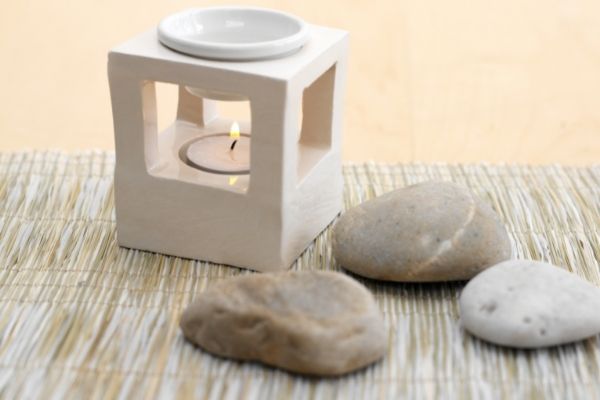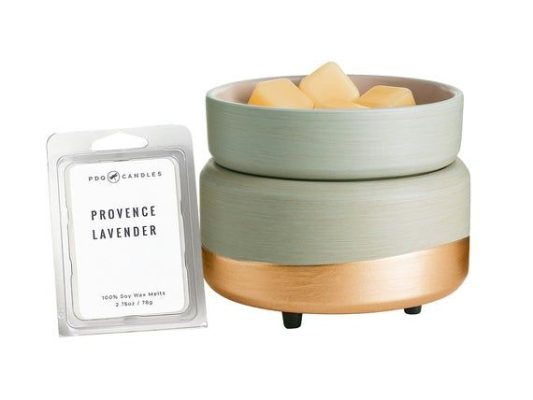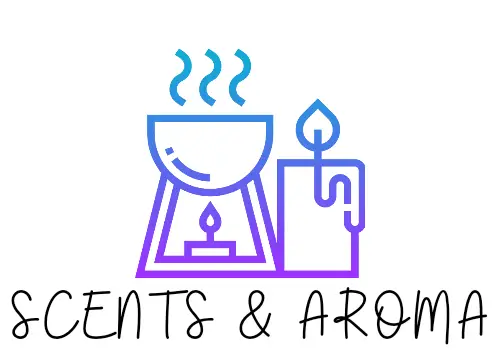With our stress levels at an all-time high, even wellness skeptics may be willing to apply a head-clearing essential oil in a wax melt. It is no secret that the herbal healing treatment, which dates back thousands of years and has recently been praised by everyone from supermodels to NBA stars, offers profound mind-body benefits.
Essential oils have many therapeutic properties, whether you use them topically or in a fragrance. When using it as a fragrance, you’ll need to figure out how to spread the scent throughout the room.

This brings up whether you can use essential oils in a wax warmer. Here’s the short answer.
Can you use essential oils in a wax warmer? Wax warmers are a great option when you want to diffuse essential oils. The warmer will distribute the fragrance in the same way as with standard wax melts. When the oils are mixed with water in the melting dish, the essential oil of your choice will scent the entire room.
I recommend this small set of essential oils on Amazon that work perfect in any wax warmer. These are some of my personal favourites.
Below is everything you need to know about using essential oils in wax melts—including pet safety and how and where to use them.
Is it safe to use essential oils in wax melts?
I’m sure you can’t live without essential oils if you’re like me. We use them for our daily well-being as they have a beautiful scent that helps us relax.
In the morning, you can use an energizing essential oil blend to jump-start your day, and in the evening, use a calming essential oil blend to help you unwind and prepare for a good night’s sleep.
It’s possible to use essential oils in wax melts. However, there are safety precautions that need to be followed. If you’re addicted to essential oils, here is what you need to know about staying safe when diffusing them in a wax melt.
This guide will now go a little deeper into the subject, however if you plan to diffuse essential oils regularly I would recommend buying a dedicated oil diffuser like this one as it is far more efficient.

Flammable essential oils
The flammability of essential oils varies, and each oil has a different flashpoint (the temperature at which ignition occurs). For example, while lavender has a flashpoint of 65 Celsius or 149 F., ylang-ylang has a flashpoint of 90 Celsius or 194 F.
Using a wax warmer to diffuse essential oils safely
Robert Tisserand, one of the world’s foremost aromatherapy experts, has studied the safety of essential oils for over a decade and published a book on the subject, it’s safe as long as the wax melt is in a burner.
Burners/vaporizers using a naked flame candle have been known to “spontaneously” catch fire, making them a fire hazard. This can happen when a naked flame comes into direct contact with concentrated essential oils and a very hot burner with an oily residue. Therefore, it’s better to use burners (which wax melts do) that do not use a naked flame.
As oxidation and chemical change is promoted by heat, you must regularly replace the old water and essential oil solution with a new one.
Will essential oils break a wax warmer?
It would help if you kept a few things in mind, but the short answer is no.
Wax warmers primarily heat up and melt candles or fragrance waxes, but you can also use essential oils in them.
Keep in mind that warmers and diffusers that use heat can rapidly change oils’ chemistry. As a result, you don’t get the full therapeutic benefits of your essential oils because they are simply evaporated for diffusion.
It’s best to use an ultrasonic essential oil diffuser for the best results because they are designed to diffuse essential oils more gently.
Diffusers will extend the life of your oils and provide more benefits, but wax warmers are a convenient, cheaper alternative.
Be careful using essential oil in wax melts around pets (some essential oil toxic to pets etc.)
Many essential oils are toxic to pets, including eucalyptus oil, tea tree oil, cinnamon, citrus, peppermint, pine, wintergreen, and ylang-ylang. Whether applied topically or diffused or even licked up, no matter how they are used, they are toxic.
It may seem harmless to use wax melts that emit a pleasant scent, but the chemicals in them can be dangerous since they use water vapor to diffuse tiny oil droplets into the air. If diffused oils are used in a small space and for an extended period of time, humans and pets are known to experience adverse respiratory effects.
It is important to note that cats and dogs are much more sensitive to scents than their human counterparts. Therefore, what you may believe to be an insignificant, fragrant aroma may be overwhelming and harmful to your animal.
Here are a few guides that i have written around popular essential oils and pets which may be of interest:
Is peppermint essential oil safe for dogs?
Is vanilla essential oil safe for dogs?
Is patchouli essential oil safe for pet?
Essential oils provide a number of health benefits
Not only does diffusing essential oils make your home smell great, but it also has health benefits. Various oils have different health benefits so that you can choose the best oil for your needs.
Calming effects are one of the significant benefits of essential oils. There are many different essential oils you can choose from that will target an aspect in your mind or body that keeps you from being calm. Some of them include:
- Stress-relieving Chamomile
- Sage, which promotes relaxation
- The scent of lavender promotes a good night’s sleep by relaxing you
- Sweet orange reduces anxiety
- Relaxing ylang-ylang, which decreases stress
Although these calming essential oils are prevalent, they aren’t the only oils that promote better health. You can also find oils that can help when you’re sick. For example, ginger oil can reduce nausea, while eucalyptus can help clear your sinuses. Lemon oil can promote happiness. Additionally, lemon oil and rosemary oil can improve your concentration and focus.
It doesn’t matter what oil you diffuse, you’ll enjoy health benefits as well. Mixing oils to maximize benefits is even possible. For example, when you suffer from allergies, you may mix eucalyptus and peppermint oils. Combining these oils will make you more alert and clear your sinuses. It can also relieve headaches caused by sinus pressure.
Conclusion
In addition to making your home smell great, diffusing essential oils will also provide you with health benefits. Using wax melts is an excellent alternative to an essential oil diffuser if you don’t have one.
A wax melt is an incredibly convenient way to diffuse oils and can serve many purposes. You’ll have a safe diffuser experience as long as you keep the melting dish filled with water and oil.
- Can You Put Perfume In A Humidifier? (Read First) - September 17, 2022
- Can You Put Essential Oil In A Steam Mop? (Safety Advice) - September 17, 2022
- How To Make Lavender Oil At Home ( Candles And Diffusers) - September 9, 2022
